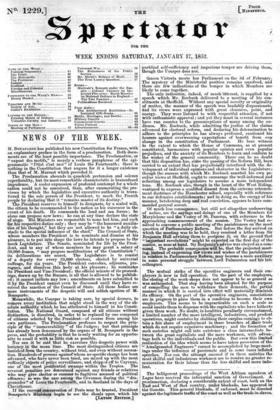NEWS OF THE WEEK.
N. BONAPARTE has published his new Constitution for France, with an explanatory preface in the form of a proclamation. Both docu- ments are of the least possible importance. The Proclamation, or "exposé des motifs," is merely a verbose paraphrase of the epi- grammatic " l'etat c'est mei" of Louis the Fourteenth ; there is nothing in the Constitution that augurs for it a longer existence than that of M. Marrast which preceded it.
The Proclamation abounds in quackish pretension and solemn superficiality, but its most remarkable characteristic is brazenfacecl impudence. A cooler expression of profound contempt for a whole nation could net be conceived, than, after enumerating the pro- visoes by which the legislative and executive authority is trans- ferred to the sole person of the President, to mock the French people by declaring that it "remains master of its destiny."
The President reserves to himself to designate, by a scaled will, the citizen to be recommended to the nation as his successor in the event of his death. He commands the land and sea forces ; he alone can propose new laws ; he can at any time declare the state of siege. THis Ministers are responsible to none but him, and each fOr his respective duties only ; they may be "the honoured arixilia- lies of his thought," but they are not allowed to be "a daily ob- stacle to the special influence of the chief." The Council of State, whose members the President is to nominate and dismiss at his pleasure, is to put into shape the laws he intends to propose to the mock Legislature. The Senate, nominated for life by the Presi- dent, and to any of whose members he may grant a salary of 30,000 francs, "may propose modifications of the Constitution " : its deliberations are secret. The Legislature is to consist of a deputy for every 35,000 electors, elected by universal suffrage, for six years. The President convokes, adjourns, pro- rogues and dissolves this body at his pleasure ; he nominates its Piesident and Viee-President ; the official minute of its proceed- ings drawn up by the Bureau, is all that is allowed to be publish- ed; it cannot initiate any law ; amendments on laws submitted to it by the President cannot even be discussed until they have re- ceived the sanction of the Council of State. All these bodies am mere instruments of the despotic will and selfish egotism of N. Bonaparte.
Meanwhile, the Usurper is taking care, by special decrees, to remove every institution that might stand in the way of the ab- solute authority which he has attributed to himself in his Consti- tution. The National Guard, composed of all citizens without distinction, is dissolved, in order to be replaced by one composed of citizens selected by the President—of course from among his own partisans. The Proclamation professes to respect the prin- ciple of the "immoveability "of the Judges; but that principle has already been denounced by the organs of M. Bonaparte in the press, and the probability is that he is only waiting for an opportu- nity to assail it with as little risk as possible. Nor can it be said that he exercises this despotic power with leniency in the mean time. The most distinguished citizens are banished from the country, without trial, and even without accusa- tion. Hundreds of persons againsrwhom no specific charge has been advanced, who have never been tried, are mixed up with the most ruflianly objects of 'police surveillance, and shipped off to Cayenne, one of the most pestilential swamps within the Tropics. The severest penalties are denounced against any friends or relatives who may give shelter or succour to fugitives accused of political offences; as was the ease among the Cevennes during the " dra- gonnades " of Louis the Fourteenth, and in Scotland in the days of Clavahouse.
. If the current conversation of Paris may be trusted, President Benaparte's Ministers begin to see the shoals upon which his purblind self-sufficiency arid imperious temper are driving them, though the Usurper does not.


























